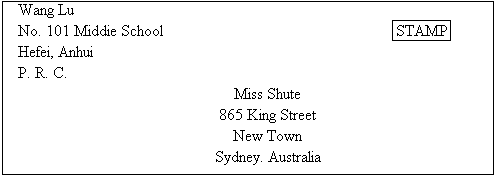题目内容
阅读理解
TV Programmes, Monday, June 12,2000 (CCTV)
Channel 118:00 TV Classroom: Computer
18:30 Popular Music
19:00 News
19:30 Weather Report
19:40 Today's Focus(焦点)
20:05 7-part TV serial (连续剧): Motherly Sister-in-law (1) (嫂娘)
21:00 Special: China in Last One Hundred Years
22:30 China Sports Report
23:00 On TV Tomorrow
Channel 2
17:30 Foreign Light Music
18:10 Children's Programme: Haier Brothers (81)
19:05 World-famous Cities; Sydney
19:38 Zhengda Programme (2000/18)
20:55 Animal World
21:15 20-part TV serial: How the Steel was Tempered(20 ) (钢铁是怎样炼成的)
22:00 News in English
22:30 Special Sports: Football Match (England/France)
00:20 On TV Tomorrow
阅读上面内容,从每小题A、B、C、D中选择能正确回答下列问题或完成句子的那一个。
1.If you wants to know something about the history of China, you may watch TV at ________.
[ ]
2.If you're going to travel in Hangzhou tomorrow, you'd better pay attention (关注) to the programme ________.
[ ]
3.You like ball games very much. You have so much time to watch a sport match. Which of the following programmes will you choose first?
[ ]
4.If you want to know the end of Paveo (保尔) , please watch ________.
[ ]
A.Motherly Sister-in-law
B.China in Last One Hundred Years
C.Haier Brothers
D.How the Steel was Tempered
5.Which of the following is true?
[ ]
A.A computer is the teacher on TV Classroom.
B.The programme Today's Focus is about traffic accidents.
C.We can enjoy ourselves in Zhengda Programme.
D.The programmes on Channel 2 will stop at 23:00.

